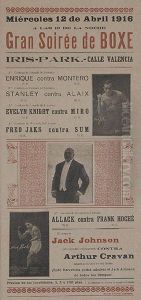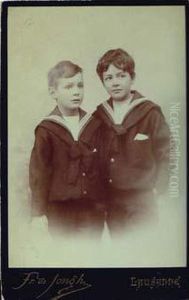Arthur, Fabian Lloyd Cravan Paintings
Arthur Cravan, born Fabian Lloyd on May 22, 1887, in Lausanne, Switzerland, was a Swiss-born poet, writer, and boxer, who became a notable figure in the early 20th-century avant-garde and Dada movements. His life was as unconventional as his art, marked by constant travel, pseudonyms, and provocations. Cravan was the nephew of Oscar Wilde, though he often fabricated stories about his life and background, including claiming to be the son of Wilde, which has intrigued and puzzled biographers and scholars. His real name was Fabian Avenarius Lloyd, but he is best known by his pseudonym, Arthur Cravan, under which he published his works and performed.
Cravan's artistic output was diverse, encompassing poetry, criticism, and performance art. He was known for his flamboyant public lectures, where he often engaged in what would now be considered performance art. These lectures were characterized by their chaotic nature, including provocations, insults directed at other artists and writers, and the airing of his anarchistic views. He published a magazine called "Maintenant!" ("Now!") that served as a vehicle for his own writings and the promotion of his avant-garde ideals. The magazine, which was deliberately confrontational and scandalous, featured his criticisms of contemporary art and culture, as well as early examples of what would later be recognized as Dadaist thought.
In his personal life, Cravan was as much an adventurer as in his artistic endeavors. He traveled extensively, often to avoid creditors or the law, and his exploits became the stuff of legend. He boxed professionally, using the sport both as a means of income and as another form of performance. In 1913, he famously fought the world champion Jack Johnson in Barcelona, a match he lost spectacularly.
Cravan's life took a dramatic turn during World War I when, to escape the draft, he fled Europe for America, eventually settling in Mexico. There, he continued his artistic activities and became involved with the poet Mina Loy, with whom he had a tumultuous relationship. The couple married in 1918. Shortly thereafter, Cravan disappeared at sea under mysterious circumstances while sailing a boat from Mexico to Argentina. His body was never recovered, and his death has been the subject of speculation and myth, contributing to his legacy as a mysterious and enigmatic figure of the avant-garde.
Arthur Cravan's influence extends beyond his literary and artistic works to his embodiment of the avant-garde spirit of rebellion, freedom, and disdain for conventional norms. Despite his brief career, he is remembered as a pivotal figure in the Dada movement and for his role in shaping the ethos of modern art and literature.

